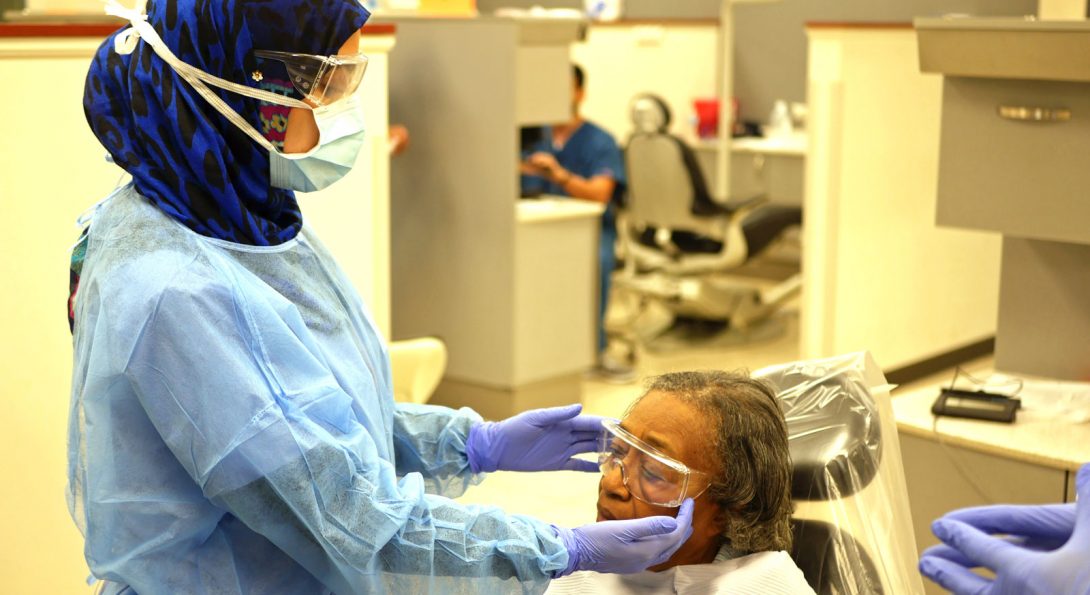Why We Take Infection Control So Seriously

Without proper infection control techniques, many of the things in a dental clinic, including people, instruments -- even computer components -- can be carriers for cross contamination and contribute to the spreading of germs and disease. Infectious diseases are caused by pathogenic micro-organisms, such as bacteria, viruses, parasites or fungi. These diseases can be spread, directly or indirectly, between dental staff and between patients.
That is why the College of Dentistry takes infection control very seriously. We follow strict infection control procedures to minimize the spread of germs and disease and keep our patients safe.
Our infection control procedures and guidelines include:
-
 Following proper hand hygiene through hand-washing and the use of hand sanitizer
Following proper hand hygiene through hand-washing and the use of hand sanitizer -
Maintaining appropriate personal protective equipment (mask, gown, gloves and eyewear) and personal hygiene
-
Proper instrument sterilization and preparation
-
Ensuring the environment of our dental clinics are clean and neat
-
Preventing the storage of anything on the floor or under a sink
-
Preventing food and drinks in clinical areas
Clean Hands
Washing our hands, and wearing gloves to keep you safe.
Although you may not see it, we wash our hands before putting our gloves on, and again when we take our gloves off after treating each patient. Keeping hands clean is one of the most important steps we can take to avoid the spread of germs.
More on why clean hands save lives (CDC)
Sterile Instruments
We maintain strict sterilization standards in the use of our instruments to keep you safe.
Dental instruments are properly sterilized and dental equipment are properly disinfected and maintained. We also cover our computer interface surfaces to protect against transfer of infection.
Safe Water
We use a clinical water treatment system to keep you safe.
We take every measure possible to conform with current recommendations for water quality and to always strive to develop new approaches to ensure the quality of water used in dental practices. Our dental clinics test the quality of water used during treatment. We also clean and disinfect dental units at recommended intervals.
Personal Protective Equipment
We use personal protective equipment (i.e. masks, gloves, gowns, and eye protection), as well as provide eye protection to patients for all dental procedures.
Do you know why you wear glasses when you’re at the dentist? The added layer of protection keeps your eyes safe from liquids or particles that could splash or drop into your eyes during dental procedures. That's wy we wear personal protective equipment (i.e. masks, gloves, gowns, and eye protection) for all dental procedures any time there is potential blood borne pathogen exposure. We also use protective covers for our work surfaces, including chairs and computers. We change these covers between each patient.
Gloves, masks, eyewear, and protective apparel help protect you and the dental team from exposure to potentially harmful microorganisms in blood, oral, or respiratory fluids. It’s up to us to make sure every dental visit is a safe dental visit.
Food and Drink
We also maintain policies that prevent bringing in food and drinks into our patient care clinics. This applies to everyone - our students, staff, faculty, and our patients.

Did you know?
There are an estimated 300 different species of bacteria living inside our mouths, totaling a billion or more at any given time.
Read more: The True Story of Why You Get Cavities, According to a Billion Microbes
September is Dental Infection Control Awareness Month!
And we're affirming our commitment to this in supporting Dental Infection Control Awareness Month in September.
For more on infection control guidelines, tools and resources, see the Summary of Infection Prevention Practices in Dental Settings:
Basic Expectations for Safe Care, prepared by the Organization for Safety, Asepsis and Prevention (OSAP).
 VIDEO: Fight Germs! Wash Your Hands!
VIDEO: Fight Germs! Wash Your Hands!
University of Illinois at Chicago (UIC) College of Dentistry
We provide comprehensive, personalized and preventive dental care and education - for the whole family - to protect and improve oral health.
Through regular examination, cleanings and preventative treatments, our goal is to develop a comprehensive treatment plan to resolve dental issues in the early stages. We provide a wide range of general dental treatments for the whole family.
More about our comprehensive general family dental care services in Chicago